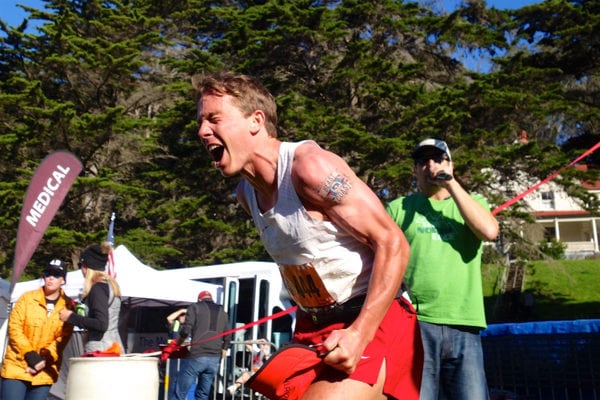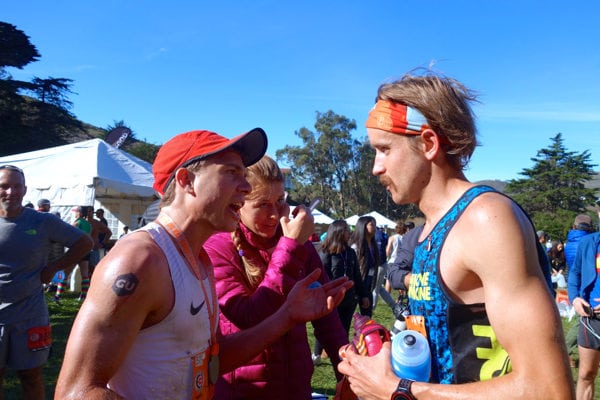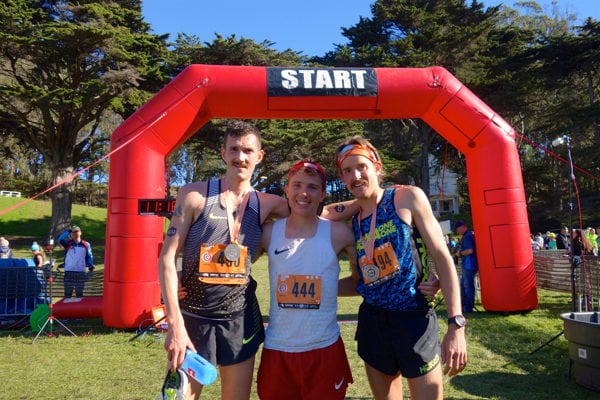I was 46.7 miles deep with a one-minute lead and 5k to go. My legs ached. My body longed to stop moving, but my heart just wouldn’t let me. I wanted to be the first one across that finish line. I was scared to death of getting caught. I had worked so hard for this moment and I wasn’t about to give in. I slammed a 12-ounce bottle of random liquids that an aid-station volunteer dumped into my bottle in about three seconds (thanks aid-station people for being so speedy) and put the hammer down. My legs seared with pain. Every stride seemed a struggle. Each foot strike brought a new wave of pain. My breathing grew labored, the finish line closer, and the pain refused to dissipate. Finally, I reached the road, a welcome sight for it meant that the end was near.
At this point I probably had enough of a lead to shut it down and cruise across The North Face Endurance Challenge 50 Mile Championships finish line in style. I could enjoy the last few moments, ease off on the gas, and let the pain subside a bit. But I was having none of that. I hadn’t shown up at the start that morning to see how comfortably I could run 50 miles. I had come to compete, not only against my fellow runners, but against myself. I was there to test my limits, to give it my all, and to see how fast I could get from start to finish. If I were to let up with a quarter mile to go and ease across the line I would be selling myself short. I’d be missing out.
And so, as I approached the finish line that day, I dug my well just a little bit deeper. I wheezed and grunted. I swung my arms, drove my legs, and gasped for air. Some might say I sounded like an out-of-practice runner trying to fulfill a New Year’s resolution. And yet I was far from it. I was a top-level ultrarunner on the cusp of a huge win. As I rounded the final corner I gave one last surge, leapt across the finish line, and collapsed. I was spent. Wrecked. Demolished.

Photo: iRunFar/Bryon Powell
Over the next few days, video footage of my push to the finish would be released. Thousands upon thousands of views would accumulate on the various online films. Many seemed to be impressed with the level of suffering. Witnessing it all, I sensed a strong element of curiosity, of people wanting to know how I could push so hard. Some seemed to want an explanation. For me that seemed at least a little bit odd, because going all out is pretty much second nature to me. It’s just who I am.
So where does it come from? This urge to never settle, to always push for more. To tell the truth, I’m not quite sure. Perhaps it’s genetic, something buried deep within me from birth. That’s one theory. My other theory is that it’s learned. My mom might tell you that it’s her fault that I can’t quit, and she has some funny stories to back it up. She’ll tell you of how when I was learning to walk I looked like an abused child. Not because I was, but because I learned to walk on concrete floors that weren’t very forgiving. Despite the floors, I wouldn’t give up. Time and time again I would fall down and bruise my fragile body. Time and again I would stand back up and attempt to traverse that hard, unrelenting surface. I was determined, persistent, and anything but a quitter. In fact, my mom tells me that my favorite book was a book called I Can. A simple book, it was about a baby and all the things he could do.
If you survive the concrete-floor story, my Mom might go on to tell you about my arts and crafts. One day, I set out to make a painting. This was all fine and good except that for some reason I couldn’t keep hold of the paint brush. I would drop my brush on the floor only to have my mom tell me to pick it back up. As frustration set in tears welled up in my eyes. And yet, my mother refused to help. “Pick it up,” she would tell me. So over and over I dropped my brush. Over and over I got upset. Over and over I picked it up and continued my painting. I’m not entirely sure what the outcome was that day, but one thing is for sure, my mom gave me no handouts.
Fast forward a few years and I’m practicing for my third-grade spelling tests. Every week I would struggle to master my spelling list. A late bloomer in school, spelling was no easy task. Tears would flow from my eyes as I desperately tried to master the list. Eventually my mom got so tired of struggling through my spelling list with me that she approached my teacher, asking why I had such hard words. “Oh, Mrs. Miller,” my teacher replied, “every week, after I put the regular words up, I add a few challenge words, hoping that the few gifted kids in the class will take them. The gifted kids never do, but Zach always writes them down, and he always gets them right, so I figure he’s fine. But now that I know this I will check Zach’s list each week and make sure that he doesn’t have any challenge words.” From then on I was banned from challenge words, but to this day I’m a terrible speller. My mom says it’s her fault, that she should have let me take those challenge words.
Was it the spelling words, the painting, and the challenge of walking that made me the way I am? Perhaps, but I think there is a bit more to it. I think that the human mind is very impressionable in its early years. I think it is not just our experiences as children, but it’s also the examples set before us that help to shape us. Fortunately for me, I grew up surrounded by exemplary individuals. My family jokes that they don’t know where I got my knack for running. While the running itself may be a bit of a mystery, the characteristics that accompany it are anything but.

Photo: iRunFar/Bryon Powell
Take my mom and dad for instance. Are they Olympic marathoners or world-class mountaineers? No. My mom is a school teacher. My dad is a mason by trade and currently a kitchen installer. Both are incredibly hard working. I’ve watched my mom go to school all day only to come home to cook us dinner, do school work late into the night, and then awake early the next morning to go to the gym at 5 a.m. I grew up in a house that my dad built with his own two hands on land that he bought at a fairly young age. The money for that land likely came from long hours in tobacco fields and early mornings catching chickens before school. I can’t help but think that having such fine examples of hard work contributed to the athletic drive that I have today.
When I’m out there pushing hard in a race, I’m doing it because that’s who I am. It’s what’s engrained in me, and not just as a runner, but as a person. Too often in life we settle for less than our best because we find it to be more comfortable. But life isn’t about being comfortable, it’s about being impactful. Not just impactful with ourselves, but impactful with those around us. The beauty of it, however, is that running, or life, can be impactful in many different ways. For some it means going all out. For others it’s enjoying the journey alongside a friend. There isn’t really a right or wrong way to do it so long as you’re making a good impact.
Looking back at TNF 50 this year I have come to realize that my race, and especially my finish, had a great impact on people. I saw this mostly in the messages I received and the comments that people left online following the race. But of all the things that seemed to impress people, two things stood out to them: my finishing kick and my interactions with second-place Hayden Hawks. Now I’m not trying to toot my own horn, but I’m referencing these things because I think they speak to all this. Sure, when I finished TNF 50 people were impressed with my time, but when you watch the videos, the focus isn’t on the clock. We are focused on the effort, the struggle, and the humanity of it all. It’s about the manner in which the task is done and the way in which the result is handled.
Next time you’re out on the race course of life or running, channel your inner roots and do your best to put forth an honest effort. At times it may hurt. Sometimes you may even want to quit. But stick with it. Find purpose and value in what you’re doing and pursue it with gusto. Follow your roots wholeheartedly, because of all the things I ran away from that day, my roots weren’t among them.
Call for Comments (from Meghan)
- What elements of your personality come from your roots, be them developed through your experiences or your exposure to other people?
- How much of your past do you think informs your present?

Photo: iRunFar/Bryon Powell
